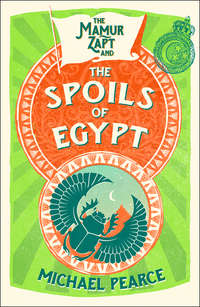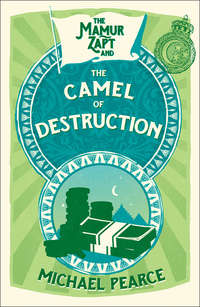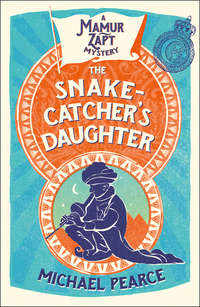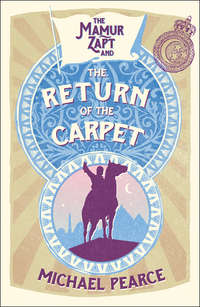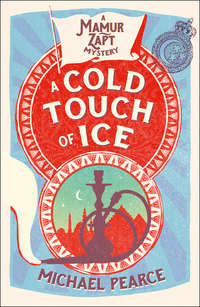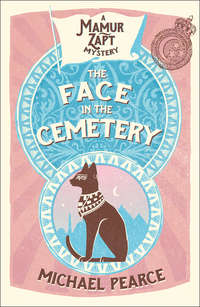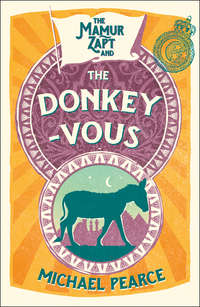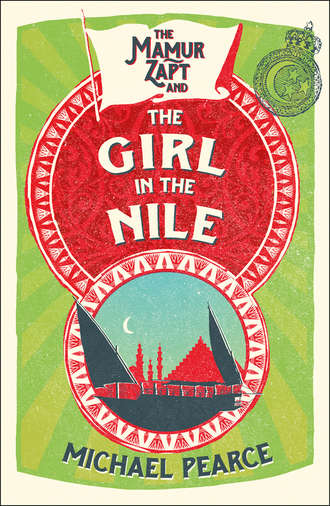
Полная версия
The Mamur Zapt and the Girl in Nile
‘Maybe to please the Prince. Or as a joke or something.’
Zeinab thought it over.
‘The other two were foreign, weren’t they?’
‘Yes. And that’s another thing. My guess is that they were from some cabaret or other. That’s where he might have come across them. You see, you said the girl would have to come from a family of rank. Well, I don’t think girls who let themselves get picked up en masse off the bank to spend a week with a bloke on a dahabeeyah are likely to be that high class. Foreign, not too classy, three at a time—that sounds like cabaret to me.’
‘No decent Egyptian woman would let herself be subjected to such a thing,’ said Zeinab, removing Owen’s hand.
‘So,’ said Owen, putting it back, ‘they must either be foreign or—’
‘Or what?’ asked Zeinab.
‘Indecent Egyptian women,’ said Owen, putting his other arm round her.
In front of him was a beautiful old building, very like a small mosque with its domes, its façade of red and white stones intermixed, its ornate panelling and intricate arabesques. It was not, however, a mosque but a hammam, a public bath-house.
The entrance was narrow and below street level. A towel hung over the door.
Owen’s men looked at him inquiringly.
The towel meant that the baths were temporarily occupied by women.
‘Leave it,’ said Owen resignedly. The men moved on. Owen made a note to return to the hammam later when the towel had been taken down.
It was not, however, a good start.
He was conducting yet another search of the quarter. His informant swore blind that the arms were still there. He had even been able to specify a little more precisely the area where he thought they were concealed. They were, he said, somewhere near the souk.
The souk was not located, as markets usually were, in a square of its own but occupied the space created by a crossroads. Its stalls spread over the whole area successfully restricting passage in any direction. Fortunately, this far out of town, there were very few vehicles to pass. The occasional horse-cart laden with stones, the occasional hand-cart carrying ice, were the closest approximation. The Souk Al-Gadira existed only for its immediate neighbourhood.
The stalls were erected and dismantled every day so there was little likelihood of the arms being hidden beneath them. They were far more likely to be concealed in one of the buildings round about and it was here that Owen was concentrating the search.
They had gone through the buildings when they had searched the area previously but on that occasion, as Owen reminded himself crossly, he had been summoned away in the middle by that foolish District Chief and sent on that wild goose chase down to the river.
There would be no repetition of that today, he told himself grimly. He would make damned sure they stuck with it and did the job properly.
Only it was not quite so straightforward. First, there had been the hammam. And now, at the end of the street, just ahead of him, was a mosque.
Again the men looked at him inquiringly. And again he hesitated.
Even the Mamur Zapt entered mosques on police business with caution. It was so easy for minister and congregation to get excited. The smallest thing would set them going. The sight of a Western face was enough.
Well, he could do something about that. He needn’t go in himself, just send the men in.
Just send the men in? The police were only slightly more grata than himself. They were seen as the agents of either an alien, infidel force (the British) or a dissolute secular power (the Khedive). In either case they were unwelcome. It needed only one irascible minister to take umbrage at some fancied slight or misdemeanour for there to be trouble.
‘Leave it,’ he said again. If there was trouble he’d have to spend the rest of the day putting it down and wouldn’t be able to get on with the arms search at all.
But this was ridiculous! First, the hammam and now this! This wasn’t a search at all. Suppose the arms were hidden inside? And there would be no coming back to the mosque!
He called the men back.
‘You two,’ he said, picking on men he had brought with him from headquarters and therefore more experienced, ‘you go in and walk through, keeping your eyes open. Don’t cause any trouble and don’t insist if they look like objecting. Just see what you can see and come back and tell me.’
The men nodded and went off. After a while they returned. One of them spread his hands, palms upward, and shrugged.
‘OK,’ said Owen. ‘Worth a try. Get after the others.’
At least it hadn’t created uproar.
He moved on up the street, or would have moved on if he had been able to. The street was one of those which led into the souk and its lower end was completely blocked by stalls. Regardless of the general press of humanity, a funeral procession was attempting to pass down it from the other end. Processions, like deaths, were extremely common in Cairo and everyone stopped to look, including Owen, who was a little surprised to see a funeral so early in the day. Usually they took place in the evening when it was cooler.
As funerals went, this was a very medium affair. First came the Yemeneeyeh, six poor men, mostly blind, proceeding two and two, and chanting mournfully, ‘There is no God but God.’ Then there were male relations of the deceased, few in this case. Next came four schoolboys, one of them carrying an open copy of the Koran placed upon a kind of platform of palm-sticks and covered with an embroidered kerchief. As they walked, they sang: in rather more sprightly tones than the Yemeneeyeh. And then came the bier, its front draped with a shawl to indicate that it carried a woman, which perhaps accounted for the general meagreness of the proceedings.
All the Cairo world loved a good funeral and the bystanders stopped what they were doing, not so much to let the procession pass but to join in the fun. But where were the dervishes, the munshids, with their singing and dancing and flag-waving? There was admittedly a fiki but he was very restrained and seemed anxious to keep himself invisible at the back. This was a poor affair indeed. Even the female mourners, who followed the bier, were few in number and boringly subdued.
Disappointed, the crowd resumed its business. Which, of course, brought the procession to a halt. Owen cursed and tried to wriggle his way round, failed and had to cut across in front of the donkeys laden with bread and water to give to the poor at the tomb. The poor, judging from the size of the loads, would benefit handsomely.
Once past, Owen hurried to catch up with his men. He fell in alongside two of them at the end of the street. They were the two he had talked to on the previous search, the ones who had been taking such pains with the dovecot.
‘Found that body yet?’ one of them asked.
‘No.’
‘You won’t, either.’
Owen stepped aside to let a water-carrier pass with his heavy bags.
‘Why not?’ he asked.
‘It’s the river. Full of tricks.’
‘It’ll come up some time.’
‘Ah yes. But where?’
‘Most of them finish up against the bridge these days, apparently.’
‘Perhaps this one will too. When it gets there.’
Owen didn’t quite understand this and would have asked more but the two men ducked into the next house. He continued slowly along the street, noting how long it took them. Everything was going to be under control this time.
There was nothing wrong with the efforts of his men at the moment. They were working through the buildings quickly and, as far as he could tell, efficiently.
They turned up the next street. It contained some taller buildings with shops on the ground floor. This would take them longer. After waiting a little, Owen sauntered on.
Half way up the street was a tall sebil, or fountain-house. It was, like the hammam, an old building, clearly predating the other buildings since the street curved back specially to accommodate it.
It was a delightful building. Its totally curved sides were fenced with grilles of exquisite metalwork and its upper storey was graciously arcaded. There was a little parapet going round the arcade and it suddenly occurred to Owen that it might provide a vantage-point from which he could more pleasantly monitor proceedings.
He climbed up the outside staircase past the fountains surrounded by black-veiled women filling their pots with water and out on to the little parapeted promenade which crowned the second storey.
From inside the arcade came the murmur of children’s voices. As with many of the larger sebils, the arcaded upper storey was occupied by a kuttub, a school where little children received their first lessons on the Koran.
Owen smiled. It was an unexpectedly tender insight on the part of the Arabs to accommodate their infants up here where it was airy and cool.
He walked to the parapet and looked over. Down in the street he could see some of his men. They approached a house and went in. Not long afterwards, watching, he saw them appear on the roof. They looked around for a moment and then went down.
From where he stood, high up, he could look down on the roofs of the houses. Most of them were flat and empty, save for the occasional bundle of firewood, the heap of vegetables, the pile of corn-stalks. One or two of the larger houses, though, had roof gardens; and, as he watched, two women came up on to one of these and began watering the plants.
It was a house about two along from the one he had been looking at previously. He hoped the women would have completed their task and departed before his men arrived. Servants would probably warn them but if there was an outside staircase and his men dashed up—?
He watched anxiously. The men went into the next house and worked through it. The women went on watering.
The men finished the house and came out into the street. And at that moment, fortunately, the women left the roof of their own accord.
Owen breathed a sigh of relief. It wouldn’t have done for the women to be met by his men. That, yet again, could have caused trouble.
What a country this was to police in! Mosques, bathhouses, roofs—you could offend someone’s susceptibilities by searching any of them. What were you to do? If it wasn’t religion, it was women!
His men, searching both sides of the street, had covered that block of houses and were now coming up the street towards the fountain-house. He went down to meet them.
‘That one next?’ said one of the men, indicating the fountain-house with his hand.
‘Of course!’
The women watched them curiously as they mounted the stairs. Owen was about to move away when one of his men appeared above the parapet and waved to him urgently.
He ran up.
In an inner room, beyond the chanting class, were some sacks and packaging. The men had picked up the sacks and shaken them out. And out had fallen two new live clips of ammunition.
‘Of course, we’re holding the teacher,’ said Owen.
‘That won’t do much good,’ said Garvin scornfully.
‘They moved the guns this morning right in front of him.’
‘This morning?’
Owen swallowed.
‘Yes, this morning. When we started searching.’
‘I thought you had people on the lookout?’
‘Well, we did. But—’
‘You seem to be mislaying a lot of things lately,’ said Garvin. ‘First, the body. Now the guns.’
‘He says that all he knows is that the men came this morning and took away the guns,’ said Nikos, Owen’s Official Clerk and Office Manager.
‘He must know more than that,’ protested Owen. ‘Where the guns were hidden, for a start.’
‘He says he was told not to use the room.’
‘Who told him?’
‘A man.’
‘What sort of man?’
‘The usual. Galabeeyah and head-dress. The head-dress held across his face.’
‘No description?’
‘No description.’
‘Keep him,’ said Owen. ‘It may help him to see better. And send Georgiades down. See if he can find out anything.’
But this was bolting the door after the horse had gone. The teacher was unimportant and probably genuinely knew nothing. Georgiades questioned several other people: the kuttub’s watchman, a fiki who taught there, people in the neighbouring shops, but to no avail. The fact was that the guns had been there and Owen had missed them twice. The first time because he had allowed himself to be called away in the middle of things and hadn’t been able to supervise the men properly. The second time because—well, because they had been smart enough to smuggle the guns away right under the noses of the men he had posted to make sure that didn’t happen.
He was back where he had started. Only this time without the guns.
And still there were distractions! Mahmoud had traced the girls who had been on the Prince’s dahabeeyah and wanted Owen’s help in interviewing them. Owen could guess why that was. They must be foreign.
Because of treaty concessions imposed on Egypt over the centuries, the nationals of certain foreign powers had legal privileges. Their houses could not be entered by the police, for instance; they had to be tried by courts of their own country, not by Egyptian courts, and so on.
The definition of nationality, already elastic in this cosmopolitan country, was easily stretched and all kinds of dubious people claimed benefit of the Capitulations, as the privileges were called.
It was common practice, for example, for a brothel-keeper brought before a court to claim that he or she belonged to a privileged nationality. It was possible, if the police applied to the Consul of a country, to get the exemptions waived. But by the time the police had secured the exemption and got back to the brothel, the keeper would have changed his nationality and they would have to start all over again.
It was another of those things, like religion and women, that required policing to be resourceful in Cairo.
If you were dealing with a foreign national it often paid to have a representative of a Great Power, like Britain, at your back. But it was probably for another reason that Mahmoud had called on him. In a sensitive case like this, where action against foreign nationals might have diplomatic repercussions, it was wise to get the British on your side first.
Owen knew this and didn’t mind it. There were even advantages in that he might be able to ‘manage’ the affair better from the inside. All the same, just now it was a distraction.
However, he went. The two girls, it transpired, did not work in a cabaret but assisted at a gambling salon. Owen thought he knew what kind of assistance that was but Mahmoud said it was not like that, or not like that entirely.
‘It’s a very high-class salon,’ he said, ‘and the people who go there are more interested in gambling. They tend to be European, though, or Europeanized Egyptians and expect the social style of a club on the Riviera. There’s a reception area where they can sit and talk and the girls sit in there too and help the conversation along.’
At the request of the salon’s owner they met the girls not at the salon but in a hotel nearby. The salon was in the Ismailia quarter where all the best hotels were. They met in the Hotel Continental.
Конец ознакомительного фрагмента.
Текст предоставлен ООО «ЛитРес».
Прочитайте эту книгу целиком, купив полную легальную версию на ЛитРес.
Безопасно оплатить книгу можно банковской картой Visa, MasterCard, Maestro, со счета мобильного телефона, с платежного терминала, в салоне МТС или Связной, через PayPal, WebMoney, Яндекс.Деньги, QIWI Кошелек, бонусными картами или другим удобным Вам способом.


